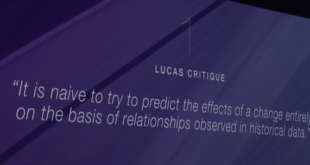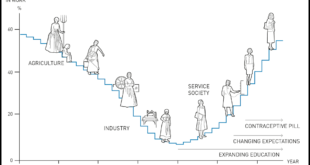Speculative manias and financial crises .[embedded content] The recurring pattern in financial crises is more or less the same. For some reason, a shift occurs in the economic cycle (such as war, innovations, new regulations, etc.) that leads to changes in the profit opportunities for banks and companies. Demand and prices rise, pulling more and more parts of the economy into a state of euphoria. Speculative mania, whether it pertains to tulip bulbs, real...
Read More »Lucas critique and the modularity assumption
Lucas critique and the modularity assumption Prima facie modular systems seem very special. But a number of authors suppose that modularity is the hallmark of causality … I have two objections to the usual claims about modularity. First, it is not a hallmark of causality. Recall the Phillips curve, a canonical example of a non-modular causal connection – one that, à la Robert Lucas, breaks down under attempts to manipulate the cause (inflation) to control...
Read More »Kapitalismus made in USA
Kapitalismus made in USA .[embedded content]
Read More »Rolling Stones 1964
.[embedded content]
Read More »Vad har vi för glädje av ekonomer?
Vad har vi för glädje av ekonomer? .[embedded content]
Read More »The fundamental econometric dilemma
The fundamental econometric dilemma There is one point, to which in practice I attach a great importance, you do not allude to. In many of these statistical researches, in order to get enough observations they have to be scattered over a lengthy period of time; and for a lengthy period of time it very seldom remains true that the environment is sufficiently stable. That is the dilemma of many of these enquiries, which they do not seem to me to face....
Read More »Claudia Goldin — gender gaps and inequality
Claudia Goldin — gender gaps and inequality The Nobel Committee has awarded this year’s Sveriges Riksbank Prize in Economic Sciences in Memory of Alfred Nobel to Claudia Goldin “for having advanced our understanding of women’s labour market outcomes”. Indeed, Claudia’s contributions to the topic are vast, perhaps best epitomised by her 1990 book Understanding the Gender Gap. This book illustrates at once her rigor as a University of Chicago-trained PhD as...
Read More »Oft gefragt (personal)
.[embedded content] Zu Hause bist immer nur du Zu Hause bist immer nur du Du hast mich abgeholt und hingebracht Bist mitten in der Nacht wegen mir aufgewacht Ich hab in letzter Zeit so oft daran gedacht Hab keine Heimat, ich hab nur dich Du bist zu Hause für immer und mich In loving memory of my mother, Lisbeth. Those whom the gods love die young. But in dreams, I can hear your name. And in dreams, We will meet again. When the seas and mountains fall And we come to end of...
Read More »Barfuß am Klavier
.[embedded content]
Read More »The LATE approach — a critique
The LATE approach — a critique One of the reasons Guido Imbens and Joshua Angrist won the 2021 ‘Nobel prize’ in economics is their LATE approach used especially in instrumental variables estimation of causal effects. Another prominent ‘Nobel prize’ winner in economics — Angus Deaton — is not overly impressed: Without explicit prior consideration of the effect of the instrument choice on the parameter being estimated, such a procedure is effectively the...
Read More » Lars P. Syll
Lars P. Syll





